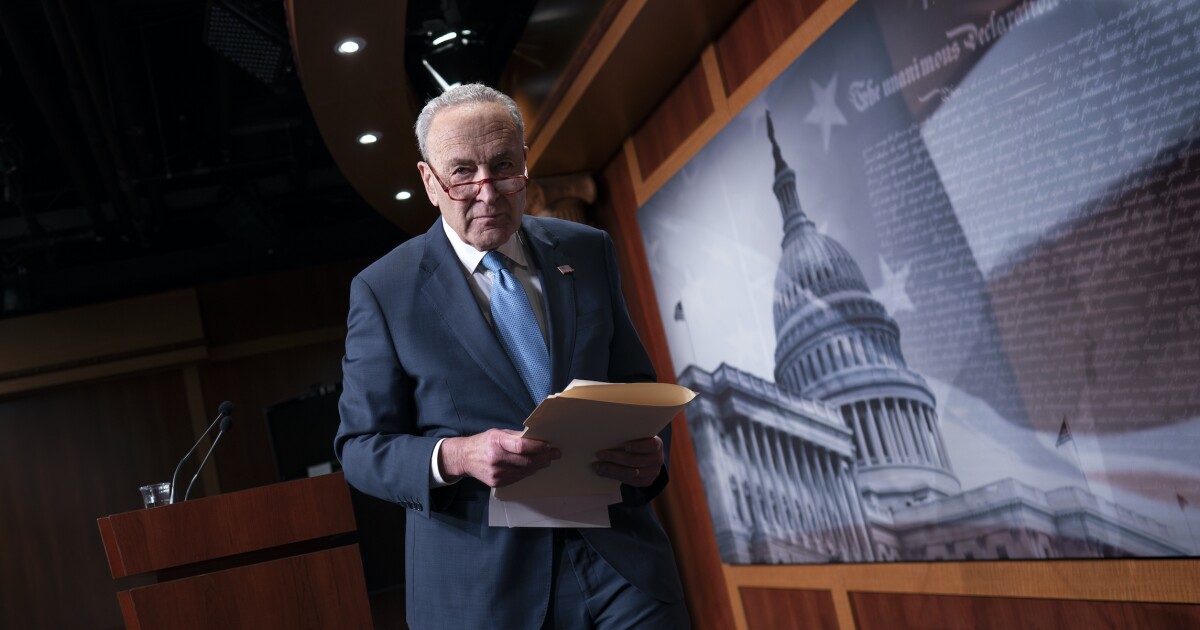

The Senate voted to punt a fight over government spending into early next year on Wednesday night, easily passing a funding bill the House approved the day before.
The 87-11 vote all but guarantees Congress will avoid the holiday time crunch of past spending clashes. Senate Democrats wanted an extension into early December but ultimately agreed to funding into January and February after Speaker Mike Johnson (R-LA) introduced a bill free of spending cuts or policy riders.
RAMASWAMY PUSHES PETITION FOR MCDANIEL’S OUSTER AS RNC CHAIRWOMAN
The White House has indicated it will sign the measure into law before a Friday midnight deadline.
Senate passage marks an anticlimactic end to the first funding fight under Johnson, who is wrapping up his third full week on the job. The speaker took great personal risk in moving a “clean” continuing resolution — his right flank tanked a procedural vote on the House floor Wednesday in protest — but the bill brought Washington back from the brink of a government shutdown.
Senate Majority Leader Chuck Schumer (D-NY) quickly moved to vote on the House bill, which passed 336-95 on Tuesday with the help of 209 Democrats. That meant negotiating a time agreement with Republicans that often gets bogged down in a raft of amendment votes.
The Senate only had to greenlight a single amendment, requested by Sen. Rand Paul (R-KY), but a separate dispute over the annual defense bill dragged the process into the night. Sen. Roger Wicker (R-MS), the ranking Republican on the Armed Services Committee, blocked the bill until Democratic leadership negotiated a path forward on the National Defense Authorization Act.
“We were on such a nice glide path this afternoon, but this whole fight over NDAA motions to instruct got a little out of hand,” said Minority Whip John Thune (R-SD), referring to nonbinding directives that get voted on before the two chambers go to conference on the defense bill.
The Senate can now skip town for a weeklong Thanksgiving break, but the display of bipartisanship does nothing to ease simmering tensions over government spending.
The two chambers are $120 billion apart on top-line numbers after Johnson’s predecessor, Rep. Kevin McCarthy (R-CA), decided to mark up appropriations bills below the levels agreed to in the spring debt limit agreement that became law.
Johnson went with the path of least resistance to avoid a government shutdown and buy himself more time to pass the House’s five remaining appropriations bills, but he simultaneously signaled the pitched battle ahead.
“We are not surrendering; we’re fighting. But you have to be wise about choosing the fights,” he told reporters on Tuesday.
Funding will expire in two stages, with some agencies lapsing on Jan. 19 and the rest on Feb. 3. But, in reality, the two chambers are only in session for a handful of weeks with the Christmas recess approaching.
CLICK HERE TO READ MORE FROM THE WASHINGTON EXAMINER
The Senate still has nine appropriations bills to pass, meaning the measures are likely to be bundled into one or more minibus bills to save time.
Meanwhile, the chamber is still working through a border bill that will unlock a deal on President Joe Biden’s Ukraine supplemental funding request.





